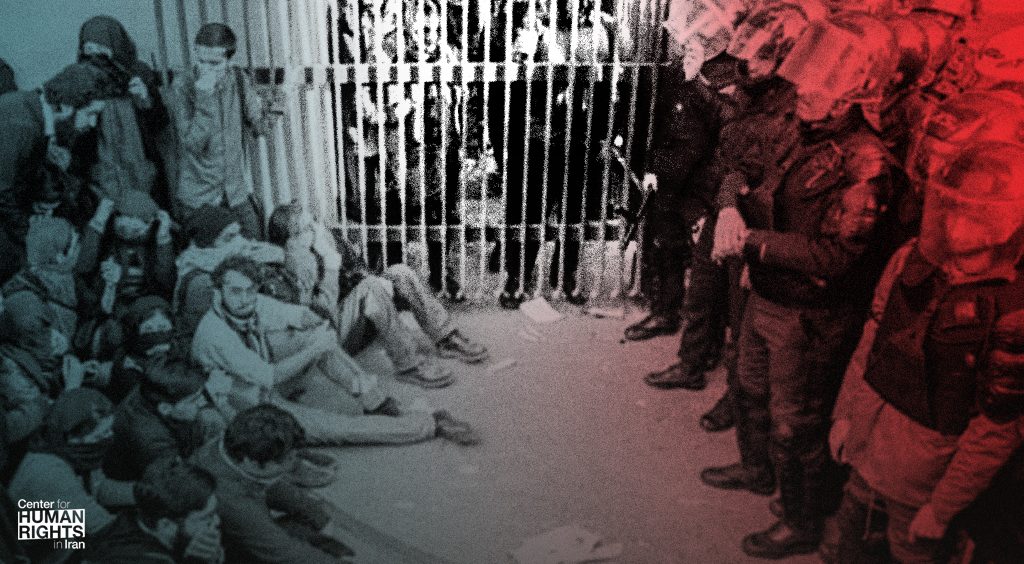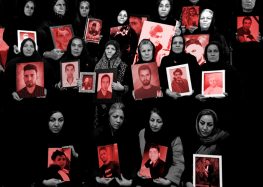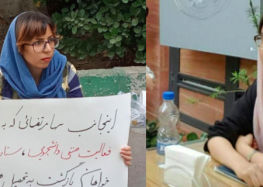Two Students Sentenced to Prison for Peaceful Protest During November 2019
 Issued on Anniversary of Protests, Six-Year and One-Year Sentences May Be Warnings to Others
Issued on Anniversary of Protests, Six-Year and One-Year Sentences May Be Warnings to Others
24-Year Prison Sentence Upheld for Peaceful Campaigner against Compulsory Hijab
University of Tehran student Marjan Eshaghi has been slapped with a one-year prison sentence, plus a suspended four-year prison term, by Branch 15 of the Revolutionary Court on the anniversary of Iran’s bloodiest protests since the 1979 revolution.
The sentence, subject to appeal, was based on the charge of “assembly and collusion against national security through participation in student rallies in November 2019,” Eshaghi tweeted on November 11, 2020.
In November 2019, mass street protests broke out across Iran over economic and political conditions, which were brutally crushed by the state through lethal force that left hundreds dead and thousands arrested.
Eshaghi was arrested with several other students at a rally in the University of Tehran by the Islamic Revolutionary Guard Corps (IRGC) Intelligence Organization agents on November 17, 2019, and taken to Evin Prison. At the end of her interrogations after 18 days, she was released on bail on January 22, 2020.
Eshaghi was tried with two other university students, including Soha Mortezaei, the former chair of the Students Trade Union Council (STUC) at the University of Tehran.
“Today [November 9, 2020], Branch 15 of the Revolutionary Court sentenced student activist [Saha Mortezaei] to six years in prison on the charge of assembly and collusion against national security,” the STUC said in a statement.
Her trial was presided over by the notoriously hardline Judge Abolqasem Salavati for her participation in a protest rally at the University of Tehran in November 2019 as well as her sit-in protests for being denied admission into a doctorate program because of her peaceful activism.
Prison Sentences are “a warning to students not to cause trouble”
“The fact that these students have been sentenced now for taking part in the November 2019 protests could be a warning to students not to cause trouble,” a source with knowledge about the case told Center for Human Rights in Iran (CHRI) on condition of anonymity on November 12, 2020.
“Morteaei’s lawyer is hopeful that her sentence would be overturned on appeal, even though it’s a difficult outcome, given her previous activism and the fact that the plaintiff is the IRGC,” the source added.
The source noted that one reason for optimism is the departure of Appeals Court Judge Ahmad Zargar, known for rubber stamping harsh sentences against prisoners convicted of national security crimes.
Many lawyers in Iran refer to Branch 36 of the Appeals Court as the “Approval Court” because of Judge Zargar’s rapid decisions in upholding sentences, the source added.
Court Rejects Review of 24-Year Prison Sentence for Peaceful Campaigner against Forced Hijab
Meanwhile, on November 9, 2020, Branch 28 of the Supreme Court rejected a petition to review a 24-year prison sentence against Saba Kord-Afshari for her campaign against compulsory hijab, CHRI has learned.
Arrested on June 1, 2019 in Tehran, she was sentenced on August 27, 2019 to 15 years in prison for “encouraging corruption and prostitution,” 7.5 years for “assembly and collusion against national security” and 1.5 years for “propaganda against the state.”
Based on Article 134 of the Islamic Penal Code, which stipulates that in the case of multiple charges, only the heaviest sentence will be served, Kord-Afshari will have to serve 15 years of her sentence.
On May 30, 2020, Kord-Afshari’s lawyer, Hosein Taj, tweeted that he had learned that her prison sentence, which had originally been rejected by Branch 36 of the Appeals Court, was going to be enforced, prompting him to seek a judicial review by the Supreme Court.
Read this article in Persian.
*This article was corrected on November 28, 2022, to reflect that Ms. Mortezaei’s first name is Soha, not Saha.






